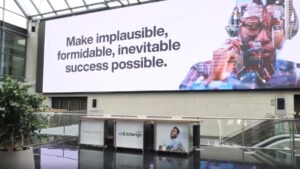By Nick Rudd, Director of Consulting at MMT
The retail industry is living through a whirlwind of change. The rise of ecommerce, the increasing popularity of mobile shopping, and the growing demand for personalised experiences is putting businesses in the sector under immense pressure to adapt and keep pace with innovation and demand.
In a volatile market, retailers with a clear strategy that gets them closer to their customers, leverages technological advancements and insights to deliver business gains, but still allows agility and innovation to flourish will succeed.
In the main, this doesn’t mean ‘rip it up and start again’. It’s about having a clear vision; a consistent approach to measuring value that is understood throughout the organisation; and a roadmap that leverages what’s in place today, while defining what is needed to improve the customer experience, drive revenue and provide a positive ROI.
The customer first approach
It goes without saying that retailers must focus on the customer: they are always right, after all.
This means understanding as well as predicting their needs and wants, then leveraging technology to create a seamless and personalised shopping experience across channels. For instance, you can utilise data insights to recommend products that customers are likely to be interested in. This is something Amazon’s empire has been built on, and shoppers have come to expect the personalised service.
Intelligent use of customer data allows you to make personalised offers and promotions that resonate with an individual shopper. This level of personalisation goes a long way to making a customer feel valued and understood while protecting margin and brand equity by not offering mass discounts.
Insight is a key component – but tech is also crucial. Integrating composable architecture in your systems can help you to quickly adapt and integrate new solutions, features and services to meet customer expectations. Composable architecture refers to an ecosystem that contains independent systems and components that communicate with each other, with the help of APIs and an orchestration layer to make management easier.
By breaking down ecosystems into modular components, a retailer can easily replace or update specific elements without disrupting their entire system. This level of flexibility underpins faster innovation, and the ability to respond rapidly to changing market trends and customer demands. MACH Alliance has more information on this.
Seamless integration for frictionless shopping
Another significant retail trend is the rise of omnichannel shopping. Nowadays, customers expect to have the freedom of choice to buy through any channel, whether online, in-store, or via a mobile app. To succeed in delivering omnichannel, retailers must ensure that their systems are integrated seamlessly.
Customers should be able to effortlessly switch between channels without any friction or loss of information. A smooth omnichannel experience helps you meet customers where they are at any moment, and provide a cohesive shopping journey.
Online channels give the opportunity to provide insights to customers in areas that shape their purchase choices – such as green production and recyclable details – as well as innovative ways to view products such as virtual shopping experiences.
The first step is to identify specific customer pain points or areas where technology can enhance their experience. With the insights gained from customer data analysis, you can then prioritise and develop technology solutions that directly address these improvements and revenue-generating opportunities.
Breaking down solutions into smaller iterations means you can efficiently gather feedback from customers and make necessary adjustments along the way. Embracing these transformative trends will allow you to create a better customer experience. The faster you learn, the quicker you can deliver what the customer wants and drive business performance.
Good housekeeping is essential
In addition to personalised experiences and omnichannel capabilities, cybersecurity must also be prioritised. As more transactions are conducted online, and via different merchants, safeguarding customer data is of paramount concern.
You must invest in robust security measures, such as encryption and two-factor authentication, to protect sensitive customer information. Retailers that prioritise security are likely to be trusted by customers, ensuring loyalty and safeguarding their reputation in this data-centric world.
A customer-first approach means being inclusive and designing digital solutions for a better future, with a focus on accessibility and sustainability. Using composable architecture, a retailer can facilitate the development of accessible and inclusive features.
You can choose and integrate specialised components or APIs that enhance accessibility, such as voice-based interfaces or assistive technologies. With the modular nature of composable architecture, you are also able to adopt sustainable practices by selectively replacing or improving specific components to reduce energy consumption or enhance sustainability strategy.
Agile teams drive innovation
Agile methodologies play a significant role in driving innovation in all of the areas described. By cultivating a collaborative culture, embracing iterative and rapid prototyping, emphasising a customer-first approach, and encouraging autonomy and ownership, you can build teams that are motivated, with employees who actively seek innovative solutions for the consumer.
Agile methodologies promote collaboration by involving employees from different departments and levels of seniority in the problem-solving process. This shared culture encourages diverse perspectives, knowledge transfer and creative thinking, fuelling innovation across the board. Importantly, it helps all parties see challenges, opportunities and solutions through the lenses of others, meaning – for instance – IT and marketing can better collaborate with a clear route to inter-departmental working.
Empowering individuals in your teams to make decisions and take ownership of their work fosters a sense of accountability and enables innovative initiatives. By having the freedom to explore and experiment within defined boundaries, employees have an environment where innovative ideas can thrive.
The retail industry is evolving rapidly, and businesses must adapt to remain competitive. By focusing on the customer, embracing technology that allows for personalised experiences and omnichannel capabilities, and prioritising security, retailers can create a better customer experience and position themselves for success.
In leveraging agile methodologies, they can continuously improve and deliver exceptional experiences that steal a march on competitors and keep customers coming back for more.












